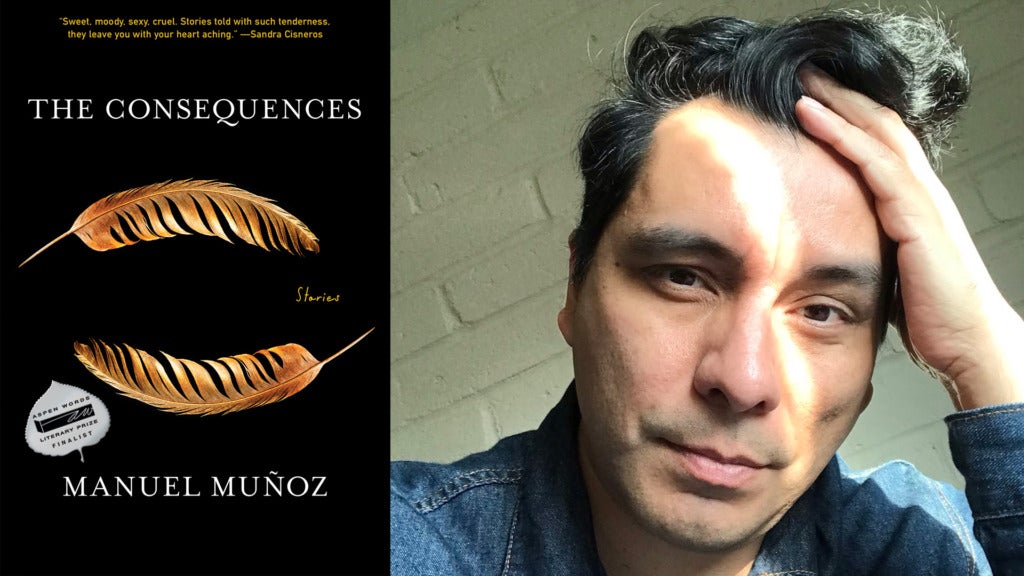In March, Aspen Words announced the 2023 finalists for the sixth annual Aspen Words Literary Prize, a $35,000 award recognizing a work of fiction that addresses a vital social issue. The selected books explore the climate crisis, racism, xenophobia, and mental health, and feature a range of dynamic voices. While the jury works on selecting a winner, Aspen Words chatted with the nominees about their work, how they view their role as a writer in this cultural and political moment, and the best piece of writing advice they’ve received.

Manuel Muñoz is the author of two previous collections and a novel. He is the recipient of a Whiting Writers Award, three O. Henry Awards, and has appeared in Best American Short Stories. A native of Dinuba, California, he lives in Tucson, Arizona.
What about our current cultural and political moment inspired you to write The Consequences?
I’m often asked about why I set so much of my work in what were formative years for me (the 70s and 80s). As time passes, I know that more and more readers may not recognize the currencies of those eras. I do it for two reasons. First, because it helps to fill in an enormous gap in our literary history, in which the stories of my communities have been largely excluded. Second—and maybe more important—is that the time itself isn’t merely a precursor to the perils of our era, but a reminder that so little has actually changed.
Can you share an experience that taught you the power of language?
My grandmother was a Jehovah’s Witness and I was pulled in Catholic and Pentecostal directions, too, all through my adolescence. I credit all of that for my skepticism, my understanding that a story always has another meaning, another undercurrent—some other way for a person to make a situation say what they need it to say for their own ends. But it taught me to respect the possibility of redemption, forgiveness, and mercy, even when they are often upended by hypocrisy.
How did the process of writing this book change you?
I struggled writing this book. I’m still learning to accept that people will impose a limitation on who I write about and what I write about. I still feel that my communities don’t receive the same level of respect for complexity and craft in regards to our storytelling. I’m glad that I persisted and that I continued to write the stories that were brown, working class, and queer: in no combination is that intriguing to most publishers (and I have all the rejections to The Consequences to prove it!). I admire so many writers who boldly declare their commitment to writing past these boundaries and I wish I had more of it. When it’s time to sit down and write, it’s painfully evident how daunting the task truly is. It took a while to work past this doubt and I’m not entirely sure that it’s gone.
Which of the characters did you find most difficult to write?
Most readers might assume it is Lis from the opening story. But it’s Mark, the older man who dates the younger Teddy in the title story, and then bails on him when Teddy is most in need. What was hard about Mark was his belief that he could find a way to make a gesture in order to feel forgiven. But when you’ve done something wrong and the person you’ve wronged can no longer forgive you, the depth of that understanding is shattering. I’m glad that some people have sympathy for him at the end of the story because I couldn’t summon it for myself all that easily. (True forgiveness is something I’m working on.)
Some say writers should write the book they need to read. Why did you need this book, and what do you hope it says to others?
I absolutely wrote it for myself. All my life I’ve been told in both subtle and not-so-subtle ways that my work is minor, regional, or limited in reach. Stories are so difficult to write that when one of them finally emerges, it feels like such a surprise, a gift to myself for not giving up. Then that surprise turns to a kind of self-affirmation—I wasn’t wrong after all. It keeps me going.
What was the last book you couldn’t put down?
In the early aughts, I used to read a lot of poetry as a way to begin my day. I was living in New York at the time and it was useful to have some lines swimming in my head as I walked crosstown to work. I don’t do that with as much focus as I used to, which is regrettable. But I think it was the combination of reading and walking that produced something in my thinking. I will pull Adrienne Rich from the shelf and read section XIII from An Atlas of the Difficult World. It’s the (Dedications) section: every few lines, a possible story is left almost at the apex of its very mention. I find it very moving and it helps to center me a little about how precious little it takes to get a scenario started.

